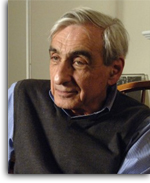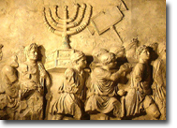 On Tisha B'Av, the "saddest day of the Jewish calendar,"
our tradition dictates that we mourn the destruction of the Temples in Jerusalem and consider the cause of their
destruction. Although we haven't known a Judaism that revolves around a Temple for centuries, we take
this day every year to remember a time when the center of gravity of the Jewish people was brutally destroyed.
This act of painful remembrance also serves as a difficult exercise in empathy: putting ourselves in the shoes
of our ancestors to understand our lost past.
On Tisha B'Av, the "saddest day of the Jewish calendar,"
our tradition dictates that we mourn the destruction of the Temples in Jerusalem and consider the cause of their
destruction. Although we haven't known a Judaism that revolves around a Temple for centuries, we take
this day every year to remember a time when the center of gravity of the Jewish people was brutally destroyed.
This act of painful remembrance also serves as a difficult exercise in empathy: putting ourselves in the shoes
of our ancestors to understand our lost past.
 This fast day is not only a day of mourning, but also a day of
collective repentance and introspection because, according to our sages, the tragedies of Tisha B'Av
were not coincidental, but the results of Jews' sin'at chinam (baseless hatred) towards each other.
Baseless hatred encompasses acts born of spite and hateful things done only to cause pain or humiliation to
another. According to the Talmud, an act of baseless hatred between two Jewish men set off a chain of events
that directly led to the destruction of the second Temple. This parable is not meant to point to that one act
as exceptional, but rather it is a representation of how baseless hatred abounded in the Jewish community and
brought disaster in its wake.
This fast day is not only a day of mourning, but also a day of
collective repentance and introspection because, according to our sages, the tragedies of Tisha B'Av
were not coincidental, but the results of Jews' sin'at chinam (baseless hatred) towards each other.
Baseless hatred encompasses acts born of spite and hateful things done only to cause pain or humiliation to
another. According to the Talmud, an act of baseless hatred between two Jewish men set off a chain of events
that directly led to the destruction of the second Temple. This parable is not meant to point to that one act
as exceptional, but rather it is a representation of how baseless hatred abounded in the Jewish community and
brought disaster in its wake.
 During a time when we remember the destruction of the world
of our ancestors, perhaps we can also undertake the difficult task of empathizing with others whose worlds
have been destroyed so we can help them rebuild as we have. This can be an intensely painful experience.
During a time when we remember the destruction of the world
of our ancestors, perhaps we can also undertake the difficult task of empathizing with others whose worlds
have been destroyed so we can help them rebuild as we have. This can be an intensely painful experience.
The recent killing of Iyad Hallak, a Palestinian man with autism, was brutal and wrong, and it has forced Israelis and American Jews to confront the Israeli authorities’ frequent abuse of power. But in a broader sense, many Palestinians are living in a broken world, and those who hoped for a state of their own are struggling to build something out of the rubble of their hopes. And though empathy is more a matter of feeling than action, the exercise of empathy can spur us to take action in our own communities. By putting ourselves in someone else's shoes, we can better understand ourselves and our missteps.
We can and should go even a step further.
While Jews have rebuilt after many destructions and traumas, some of this rebuilding has been at the expense of the national aspirations of the Palestinians. It is difficult to think of ourselves as people harming others, as occupiers, or even as guilty bystanders. Still, by understanding Palestinian anger and anguish, we can gain the resolve, the political will, to help in the rebuilding of their world. We are, after all, experienced rebuilders.
Israel’s rule of another people, in perpetuity, harms not only the Palestinians but poses an existential threat to Israel’s own future, no less. Therefore, helping rebuild the Palestinians’ shattered world means rebuilding Israeli democracy, security, and moral character.
 Jerusalem Chief Rabbi Aryeh Stern, center, speaking to members of Iyad
Halak's family during a condolence call on June 2, 2020. (Courtesy: Jerusalem Municipality)
Jerusalem Chief Rabbi Aryeh Stern, center, speaking to members of Iyad
Halak's family during a condolence call on June 2, 2020. (Courtesy: Jerusalem Municipality)
This Tisha B'Av, let us cultivate empathy in our communities and root out the spiteful hatred towards Palestinians that sometimes plagues our discourse and actions.
 As we mourn the destruction of a long-ago world, we can find
the tools to rebuild from more recent destructions and avert further tragedy and democratic regression. While
this day is a sad day, a time to dwell quietly on past trauma, we must take advantage of the urgency
of this moment to spring to action and raise our voices together with all those ready to join us in the
pursuit of justice and peace.
As we mourn the destruction of a long-ago world, we can find
the tools to rebuild from more recent destructions and avert further tragedy and democratic regression. While
this day is a sad day, a time to dwell quietly on past trauma, we must take advantage of the urgency
of this moment to spring to action and raise our voices together with all those ready to join us in the
pursuit of justice and peace.
B' Shalom,
Michael Walzer
Member of the Board of Directors
Americans for Peace Now